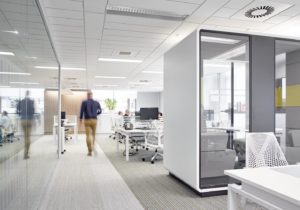Aberdeen is Europe’s current energy capital and will hopefully become its renewables centre of excellence. Supporting the future economic prosperity is dependent on providing more high quality (Grade A) office space. A phrase I read the other day described the future office being ‘the espresso office’ – small, but powerful. Is this where Aberdeen has the opportunity to retain the character of the city centre but provide the quality the market demands, and do so through sustainable development?
Should a focus on renewables in Aberdeen go hand in hand with a focus on retrofit and refurbishment? I believe that it does, and believe that today’s designers and architects will need to educate clients along the way as to what is achievable.
Landlords and investors will also need to be educated. The last thing they want is to have stranded assets that ESG-conscious organisations overlook in favour of spaces that are sustainable and place a high premium on access to staff amenities.
Coffee is often described as being vital to the smooth running of organisations. Perhaps these espresso offices are vital to the resurgence of the city centre – there are numerous buildings in Aberdeen that are suitable for transforming into espresso offices. When West Dunbartonshire Council re-located their HQ back to the town centre, there was an immediate knock-on effect with businesses opening adjacent to the new building. Let’s see what impact the Silver Fin building has on neighbouring businesses now that Shell has taken occupation.
The transformation of old buildings has to be informed, there is no point in upgrading the internal fit-out of a space while failing to address the underlying poor energy performance. We know that on the face of it, some retrofitting seems to add up, but not when you consider the whole lifetime carbon costs – a perfect example being the decision to install triple glazing; the embodied carbon exceeds the pay back in energy efficiency.
In creating these “small, but powerful” spaces the Circular Economy has to be at the forefront of the client’s mind (as much as they are at the forefront of designer’s minds). Re-use where possible makes commercial sense and minimises the amount of waste material that goes to landfill.
Given that 80% of the offices we will occupy in 2050 are already built, it is crucial that we prioritise retrofitting and refurbishing existing office spaces to reduce our carbon footprint and preserve our built environment. As professionals in the industry, we have a responsibility to prioritise sustainability and make informed decisions that will benefit both the environment and our cities.
Let’s talk about the future of the Aberdeen office sector. The coffee is on me – what are you having? An espresso?




